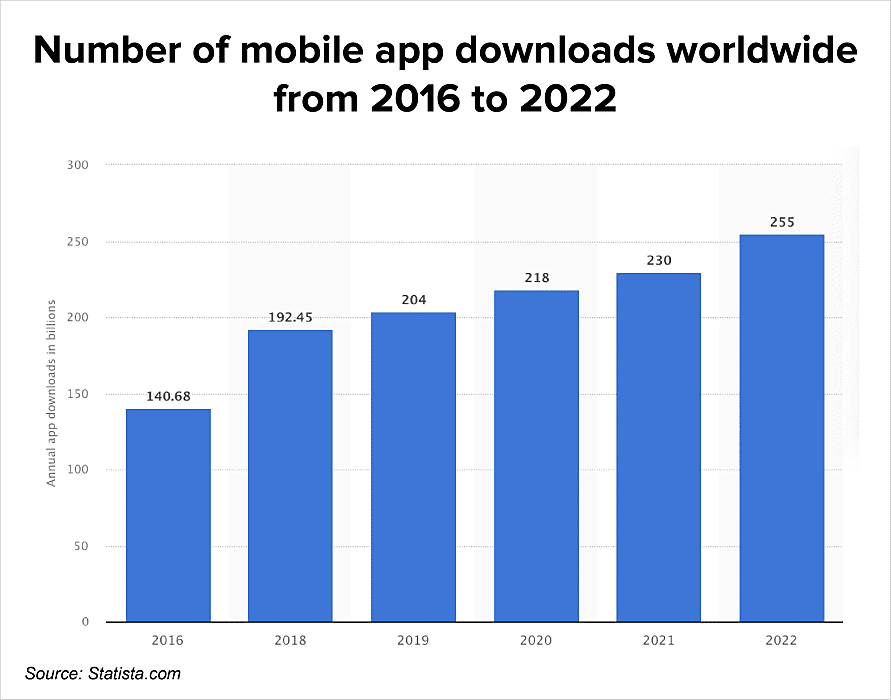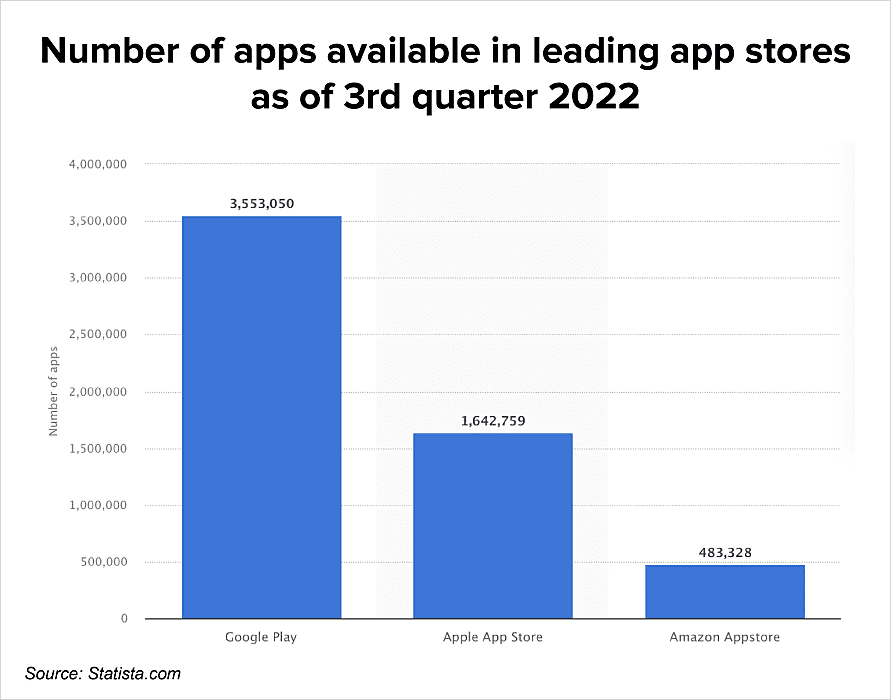
Did you know your smartphone has more computing power than the guidance computer of NASA during the Apollo 13 mission? Staggering right; technology has jumped drastically within a span of just a couple of decades. Where we used pen and paper to perform basic tasks in the olden days is now being replaced by high-end software and applications capable of performing mammoth-scale tasks in a matter of seconds.
Companies understood the potential of software and applications in the early days and adopted these new and growing technologies into their businesses. Cut to 2023; we are a hyper-connected society with almost every major task being operated by an application or software.
With so much demand and emphasis on mobile applications, it's easy for your app to get lost in the sea of applications in the market. However, there is a resolution. Mobile app marketing is allowing businesses to skyrocket their app rank at the top of the search list. But can you do it alone, or do you need the expertise of a specialist? Today’s post aims to answer this question and explain the role of app marketing companies in making your app a hit.
Numbers Speak Volumes
It is no secret that mobile app development is going places, and with it, it's marketing need. In 2022 alone, consumers downloaded a staggering $255 billion in mobile apps worldwide, according to Statista. This entails that the total number of downloads has risen by more than 10% compared to the previous year. This was a real-life example of the mobile app industry's rapid growth and immense potential for app marketing.

Moreover, as per another study by Statista, in 2022, there were approximately 3.55 million apps available for download on Google Play Store and 1.64 million on Apple's App Store, with these numbers continually rising.

The app market is showing no signs of slowing down, and consequently, app marketing is also becoming an indispensable tool to ensure your app doesn't get lost in the sea of options.
What is Mobile App Marketing?
Mobile app marketing is an advertising medium that can complement a brand's offline experience, drive e-commerce, or simply help connect a brand with its loyal customers.
- Think with Google
As the name suggests, mobile app marketing is simply the process of advertising and promoting your app to the general audience. It refers to the different techniques, methods, and processes of making your app discoverable, marketing it to different platforms, and encouraging more users to install and use the application.
It is a crucial aspect of app development that starts from the first interaction you make with the users when they first land on the application all the way to the end until they become your regular and loyal users. The end game of a mobile app advertising strategy is to increase visibility, drive downloads, increase user engagement, and ultimately boost revenue generation.
How App Marketing Companies Help Your App Stand Out
Successfully marketing your mobile app requires a well-structured approach. App marketing companies follow a 3 stage plan that helps them identify the market, make necessary preparations, conduct campaigns, and eventually track and analyze performance. Let’s explore the role of app marketing companies in making an excellent mobile app advertising strategy.
1. Pre-launch stage
Like any other strategy-making process, gathering all the relevant information about the app, target market, and competitors is crucial for launching an app marketing strategy. These marketing companies understand the relevance of this stage and perform the following functions before launching the app.
a) Define Your Target Audience
Understanding who your ideal users are is the primary roadblock before launching an app marketing strategy. To make an impactful campaign, marketing companies need to identify the target user base, demographics, preferences, and pain points. This step also involves creating an ideal profile of the user or ‘user persona.’ The audience fitting into that criteria will be the primary audience of the application. Defining a target audience helps companies tailor their marketing efforts to resonate with this audience.
b) Market Research and Competitor Analysis
Researching the target market and analyzing what your competitors are doing is yet another step that app marketing companies take to ensure optimal user engagement and ROI. These agencies start by conducting comprehensive market research to understand your target audience and market trends. This data-driven approach enables them to develop strategies weaved to your app's unique selling points.
The research stage also involves identifying and engaging with the most influential groups, blogs, websites, and forums often visited by your target audience. It also includes connecting with influencers your user persona would follow on social media channels.
Moreover, app marketing agencies also study competitors to identify gaps in the market, opportunities for differentiation, and successful marketing strategies within your niche. This step showcases the importance of app marketing companies, as conducting market research without proper resources and processes in place can lead to inconsistent and unreliable results.
c) Engage on Social Media Platforms
Social media can be a gigantic source of generating organic traffic. In 2022, the average time spent on social media amounted to more than 150 minutes per day, making it a great marketing channel now more than ever. It provides you a platform for businesses to regularly post related content and update your audience on the latest product developments.
Here, the importance of app marketing companies comes into the light as they leverage these platforms and create a presence on social media platforms on your behalf. They engage with potential users, share valuable content, and run targeted mobile app marketing ad campaigns for awareness and conversion.
d) Create content marketing strategies
The pre-launch phase also includes preparing the necessary content plan for the app promotion strategy that caters to your application and launch. Firstly, creating and publishing blogs and articles in advance is a great way to hook the audience. So, at the time of the launch, your app already possesses a group of audience ready to download the app. Content marketing also includes preparing initial posts, creating product videos, publishing engaging app screenshots, and more.
2. Post-launch stage
At this stage, the app is live, and now the objective is to generate installations and encourage downloads via different app marketing strategies. Also known as the acquisition stage, this phase is a continuous process that requires constant modification and monitoring. It's important to push the app downloads in the first week of the launch as it greatly helps in improving the ranking of the application.
a) App Store Optimization (ASO)
App store optimization, or ASO, is a critical aspect of mobile app marketing that focuses on optimizing your app page. ASO helps in increasing your app's listing on app stores to improve its visibility and ranking. App marketing companies excel in ASO optimization and helps clients with keyword research, app descriptions, and creating compelling visuals that lead to better conversion rate via advanced ASO tools.
b) Analytics and Iteration
It is beneficial to track the source of your downloads so that you can identify which channel is generating the most traffic and which channels need improvements. Marketing agencies use analytics tools to track the performance of marketing campaigns and the app itself. Data-driven insights allow them to make informed decisions and continuously refine their strategies for optimal results.
c) Paid marketing
While the organic way of promoting the app works to an extent, paid marketing channels can give your app an extra nudge.
- Paid Press Releases: Distributing paid press releases through platforms like PR Newswire or Business Wire can provide your app with valuable exposure and drive app downloads.
- Targeted Ads on Social Media: Mobile app marketing campaigns also include social media ads such as Facebook, Snapchat, or Instagram, which offer a highly sophisticated advertising platform that allows you to target specific demographics, interests, and behaviors.
- Popular Ad Networks: Popular ad networks such as AdMob, Chartboost, and Unity Ads enable you to display your app advertisements in other mobile apps.
- App Directory Listings: Submitting your app to app directories and review websites can boost your app's visibility. Sites like Mobileappdaily and Product Hunt allow you to showcase your app to a community of app enthusiasts and potential users.
3. Retention stage
Getting users and promoting app downloads is one thing, but retaining those users is a different thing altogether. The best tactic to retain customers is to create a valued relationship with them. Below is a list of strategies that can be used to increase retention.
Pro tip: Running your retention campaigns together with your acquisition campaigns will ensure active engagement from the onset.
a) User Feedback
User feedback is a great way to get into the user's mind, gather information on how your app is being perceived in the marketplace, and retain users. Feedback can help you polish out the few hiccups of the app that would hamper the user experience. Thus leading to enhanced retention.
b) Push notifications
A tried and tested method of increasing retention is through push notifications. In fact, according to a study, push notifications can boost ROI up to 3500%. You can trigger push notifications as a gentle reminder about the latest updates, personalized deals, or just a subtle message that encourages users to open the app.
Need of App Marketing in 2023
Now that we understand how mobile app marketing companies uplift your application, let’s look into why you need marketing for your app. The mobile app is a big market, and promoting your product can only increase your chance of making the app viral. Mentioned below are some merits that explain the importance of app marketing strategies.
1. Provides Visibility in a Crowded Market
With millions of apps available for download, users rely heavily on app stores' search and recommendation algorithms to discover new apps. App marketing companies employ effective strategies that ensure your app appears prominently in these searches and recommendations, thus increasing its visibility.
This helps potential users quickly find your app from the plethora of other applications in the market. Plus, more visibility means more brand awareness, which translates to better recognition and reliability toward the business.
2. User Acquisition and Retention
Most companies focus only on acquiring new users for the app. However, this form of accusation can prove to be myopic. To play the long-term game, focusing on user acquisition and retention must be a priority. Generally, attracting users is just the beginning; retaining them is equally important. Mobile app marketing helps you acquire new users and engage and retain existing users via several well-crafted strategies like push notifications, in-app advertisements, and personalized experiences.
Netflix offers one of the best mobile app marketing examples. The company does a great job of crafting personalized and customized push notifications for its users with the help of AI algorithms. They analyze and trigger notifications based on the user's behavior, mood, and preferences that encourage the user to open the app or continue surfing through the app.
3. Building Brand Reputation
An effective app marketing plan goes beyond immediate downloads. App marketing is not only for encouraging users to install the app or create engagement. Mobile app marketing campaigns are also used to create brand awareness and reputation within the market. A carefully orchestrated app promotion strategy helps build your app's reputation. Positive reviews, user feedback, and consistent user communication can enhance your brand image and trustworthiness.
For instance, Nivea Sun’s app marketing plan spread the philanthropic message of Nivea Cares with one of its mobile advertising strategies. The company put single-use tear-out bracelets in magazines for parents to put on their children. The bracelet provided the location of their children with its intuitive Nivea Protects app. The parents were able to track their kid’s location whenever they ventured out too far from their parents.
4. Maximizing Revenue
Monetizing your application is probably one of the primary objectives of any business, and app marketing can surely help bump up profit generation. Whether your app relies on in-app purchases, subscriptions, or ads, a marketing strategy for apps can drive users toward these revenue-generating channels, thus increasing your ROI.
Mobile app marketing companies work on optimizing your app's conversion rates via different marketing channels. Whether it's improving the efficiency of your subscription sign-up process or increasing ad click-through rates, these optimizations directly impact revenue.
5. Adapting to Market Trends
While working for such a dynamic and ever-changing user base, companies need to be on their toes and constantly search for new trends, technologies, and features that they can incorporate into their apps. App marketing companies stay updated with the latest industry trends and user behaviors. They can help you pivot and adapt your app's features and marketing approach to stay relevant and competitive in the market.
For example, ever since the boom of AI and predictive analytics, many big shots and even smaller apps are turning their heads towards AI-infused chatbots.
Conclusion
The world of mobile apps is thriving, but success is far from guaranteed. App marketing companies play a vital role in helping your app rise above the competition. With their expertise, these firms allow you to get the most out of your mobile app marketing campaigns. So, you don't have to worry about downloads and acquisitions and can focus on core objectives.
We hope this mobile app marketing guide helped you better understand the need for marketing for your app in 2023 and the importance of app marketing companies in making your product successful.
Frequently Asked Questions

By Sakshi Kaushik

Content Writer (B2B Editorial)
A passionate writer and tech lover, she strives to share her expertise with mobile app developers and fellow tech enthusiasts. During her moments away from the keyboard, she relishes delving into thriller narratives, immersing herself in diverse realms.












